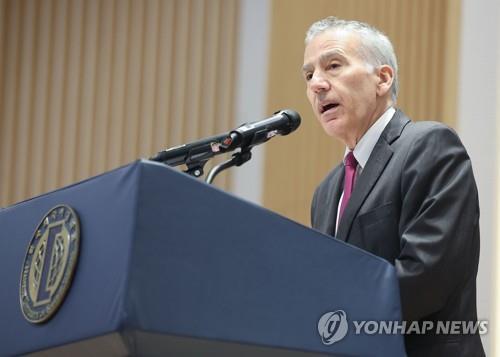- California Assembly OKs highest minimum wage in nation
- S. Korea unveils first graphic cigarette warnings
- US joins with South Korea, Japan in bid to deter North Korea
- LPGA golfer Chun In-gee finally back in action
- S. Korea won’t be top seed in final World Cup qualification round
- US men’s soccer misses 2nd straight Olympics
- US back on track in qualifying with 4-0 win over Guatemala
- High-intensity workout injuries spawn cottage industry
- CDC expands range of Zika mosquitoes into parts of Northeast
- Who knew? ‘The Walking Dead’ is helping families connect
‘Patience, diplomatic skill’ necessary in Korea-Japan talks about Fukushima visit: U.S. amb.
South Korea and Japan should exercise “patience and diplomatic skill” during talks about details of a planned inspection visit by South Korean experts to Japan’s crippled Fukushima nuclear power plant, U.S. Ambassador Philip Goldberg said Friday.
Goldberg made the remark during a Q&A session after a lecture at Hankuk University of Foreign Studies, as South Korea and Japan opened a working-level meeting in Seoul to determine specifics of the inspection, stressing that the overall objective of such an inspection is to make bilateral relations better.
“So now there’s a discussion between the foreign ministries about how exactly that will be carried out. And so again, it needs to be done with patience and diplomatic skill,” Goldberg said.
“We believe that the overall objective, which is to create a better environment for relationship between two modern and democratic countries that share values, is hugely important for the security in the region and prosperity in the region,” he said.
The inspection trip, set for May 23-24, is one of the outcomes from a recent summit between President Yoon Suk Yeol and Japanese Prime Minister Fumio Kishida and shows relations between the two countries are warming after years of fraying over the issue of wartime forced labor.
Still, there appears to be a gap between the sides over the nature of the inspection.
South Korea says the inspection is aimed at looking into whether Japan’s treatment facilities are working properly, while Japan says the inspection is meant to “help deepen understanding” about the safety of the release, not to evaluate or certify its safety.
Goldberg’s emphasis on patience and diplomatic skill could reflect concern about the gap.

Relations between Seoul and Tokyo have warmed significantly since the Yoon administration offered in March to resolve a dispute over wartime forced labor by compensating the Korean victims without contributions from Japanese firms.
That led to the resumption of “shuttle diplomacy” of regular leader visits after 12 years.
Goldberg praised Yoon for making a “quite brave political move” to start mending ties with Japan.
“One of the things that has happened … is that it has opened up more space for the kinds of projects, programs, military cooperation that will help secure both countries and that includes through trilateral cooperation with the United States,” he said.
During the lecture, the ambassador called on South Korea to “keep speaking out” against Russia’s invasion of Ukraine, stressing the importance of the two allies working together on global issues.
“We need you to work with us to find solutions to the climate crisis. We need you to continue standing up for our shared democratic values, such as respect for human rights,” Goldberg said. “And we need you to keep speaking out against atrocities, like Russia’s war in Ukraine.”
The ambassador also reaffirmed the U.S. security commitment to South Korea is firm.
“There should be no doubt that our commitment to the Republic of Korea’s defense is ironclad, as it has been for the past 70 years,” he said.
Goldberg denounced North Korea’s destabilizing actions, such as missile launches, saying Pyongyang is using its scarce resources to develop weapons of mass destruction, rather than caring for its people.
Still, he said diplomacy is the “only viable way to achieve a safe and stable Korean Peninsula free of nuclear weapons.”
The envoy also spoke at length about the recent summit between Yoon and U.S. President Joe Biden, saying the two leaders “looked a lot like old college friends.”
“To ensure we are ready to stand against any threat, our presidents announced a new forum to discuss the full range of our combined defensive capabilities, including nuclear, conventional and missile defense,” he said, referring to the Washington Declaration adopted at the White House summit.











